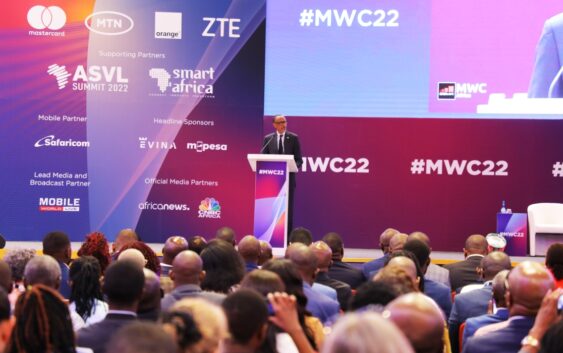- SCZONE SIGNED DEAL WITH CHINESE INVESTORS FOR IRON PRODUCTS PROJECTS IN EGYPT
- WESTPROP HOLDING LIMITED SET TO CONSTRUCT US$174M PIPELINE PROJECT IN ZIMBABWE
- FORMER TOGO PLAYER ADEBAYOR LAUNCH SOCIAL HOUSING PROJECT IN TOGO
- AMANSIE WEST DISTRICT ROAD PROJECT BEGINS IN GHANA
- LAGOS TO CALABAR HIGWAY PROJECT: WHY IT CANT BE ACHIEVED
RWANDA PRESIDENT SAYS DIGITAL TECHNOLOGIES ARE KEY FOR DEVELOPMENT IN AFRICA

Digital technologies are a catalyst for development in Africa yet almost half of the low and middle-income countries do not have access to the internet even when living in areas in areas with broadband coverage, said President Paul Kagame while opening the Global System for Mobile Communications Association (GSMA) Mobile World Congress (MWC) on Tuesday, October 25, in Kigali.
The Congress has brought together a variety of tech players, business leaders, and policymakers from the mobile ecosystem over a packed three-day agenda for the first in-person edition. It is the first time the Mobile World Congress is held in Africa.
According to Kagame, digital infrastructure is key but not enough, “to leverage the potential of connectivity, investment in digital skills and literacy must be integrated into our national policies.”
He referred to Rwanda’s innovation city saying that it aims to develop a competitive and productive workforce and a conducive environment for start-ups.
“Africa is home to creative and tech-savvy youth looking for the right platform to contribute solutions. We cannot afford to reduce them to a statistic only or sit idly by as they seek opportunities outside Africa. Our young people have a lot to offer, we must do our part and keep our promise to them,” said the President.
However, Kagame pointed out that “to leave no one behind means several things as well, and we must recognize that digital transformation is not a zero-sum game, where progress must come at the expense of the most vulnerable. Not at all. Everyone, regardless of status, gender, or nationality, must benefit, if we want to create lasting change.”
Universal and meaningful connectivity for all, according to the President, can be a springboard for the full implementation of the African Continental Free Trade Area.
“This is less about leapfrogging legacy systems, and more about digitizing faster and taking full ownership in building the Africa we want, because we can, all of us together. Everywhere in the world, emerging technologies are shaping our economic future, as well as the conditions for peace and security,” he said.
The Director General of GSMA, Mats Granryd, also emphasised that, “Together we need to make sure that we are working towards building a better and more resilient future for everyone and that means leaving no one behind. It is a big responsibility but also a wonderful privilege.”
He added that in the last two decades, mobile growth in sub-Saharan Africa has been a phenomenon and by the end of 2021, there were over 500 million people on the continent taking up mobile services which is about 46 per cent of the continent’s population and the number expected to grow to 600 million people by 2025.
Granryd hinted on several reports that will be launched during the three-day congress which will highlight Africa’s status regarding connectivity.
To ensure no one is left behind in digital connectivity, the Chief Sustainability and Corporate Affairs Officer at MTN Group, Nompilo Morafo said, “We need to ensure more businesses have access to devices, affordable data, relevant service offerings such as IOT (internet of things) and cloud solutions”
She added that providing mobile infrastructure itself is not enough and that there are various interventions needed to ensure no one is left being.

